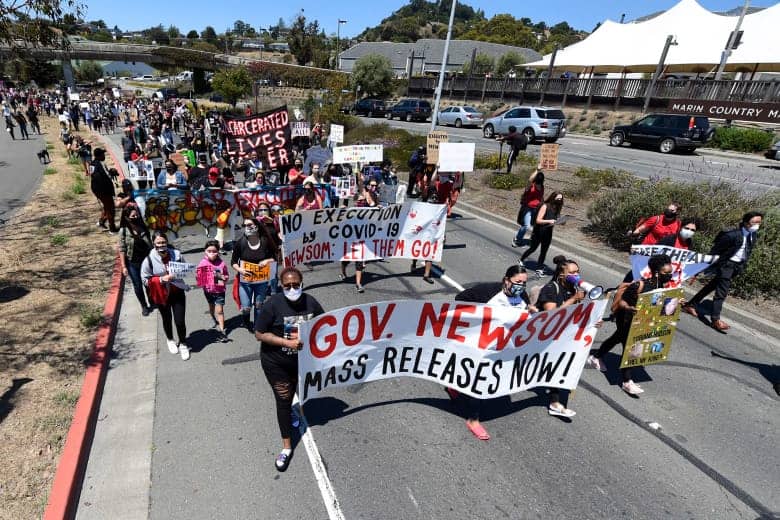
Hundreds of incarcerated petitioners allege CDCR caused an explosive, deadly COVID-19 outbreak at San Quentin, constituting ‘cruel and unusual punishment’
by Valerie Ibarra, SF Public Defender’s Office
San Francisco – Nearly a year since the disastrous transfer of COVID-19-infected persons from California Institution for Men (CIM) to San Quentin, the case against San Quentin State Prison and the California Department of Corrections and Rehabilitation (CDCR) for the resulting massive outbreak of COVID-19 has been on trial in Marin County Superior Court since May 17.
The hearing is expected to last several weeks. “This case provides even more evidence of how harmful our system of mass incarceration is, exposing its fundamental failures and illuminating the dire need for decarceration,” said Mano Raju, the public defender of San Francisco.
The cases come to court as individual “habeas corpus” petitions – emergency filings alleging unlawful incarceration under the Eighth Amendment to the United States Constitution’s prohibition against “cruel and unusual punishment.” Over 300 petitions were joined together for the evidentiary stage of the proceeding.
These consolidated cases have been unfolding since last summer, when hundreds of emergency petitions decrying inhumane conditions were filed after a fateful decision by CDCR in May 2021 to transfer 121 people from CIM – then the state prison with the highest COVID-19 rate in California – to San Quentin.
There were no confirmed cases of COVID-19 at San Quentin before the transfer. As a result of the transfer, over 2,614 people living and working at San Quentin tested positive for COVID-19 and 29 have died – making it one of the worst outbreaks in the country.
The crisis led to severe staffing shortages and extreme fear for those trapped inside and their families. In one such habeas case, In re Von Staich, a three-judge Court of Appeal panel found the conditions at San Quentin amounted to cruel and unusual punishment in violation of the Eighth Amendment because the prison did not heed expert advice to halve the population there, thus failing to take reasonable, known measures that would prevent death and serious illness.
The public will learn firsthand that this was a tragic, but entirely avoidable, human rights disaster – something Californians do not expect to see in civilized society.
The state appealed that decision to the California Supreme Court which directed the appellate court to consider whether the matter required an evidentiary hearing. The appellate court ultimately transferred the case to the Marin County Superior Court for that purpose, where it joins hundreds of others awaiting their day in court.
Richard Braucher, staff attorney at the First District Appellate Project, who represented Von Staich and is now part of the legal team representing petitioners in the Marin County case, explained: “In the Court of Appeal opinion of In re Von Staich, decided last year without a hearing, Justice Anthony Kline declared: ‘By all accounts, the COVID-19 outbreak at San Quentin has been the worst epidemiological disaster in California correctional history.’
“Now that this case is going to a hearing in Marin County Superior Court, the public will learn firsthand that this was also a tragic, but entirely avoidable, human rights disaster – something Californians do not expect to see in civilized society.
“The evidence will unfailingly show that the outbreak and the death, sickness and human suffering it brought was not at all accidental, but rather was the inevitable consequence of CDCR officials’ deliberate indifference to the lives and wellbeing of many hundreds of people at San Quentin, who, unable to protect themselves from the virus, were at the mercy of prison officials who failed to protect them.”
Petitioners are asking that prison officials be held publicly accountable for their actions in causing the worst COVID-19 outbreak in the nation and the illness and deaths that ensued. And petitioners are asking for dramatically improved living conditions so that nothing like this can ever happen again.
We must hold the CDCR accountable for their actions and ensure that incarcerated individuals are treated with the respect and dignity due to them as human beings.
“This isn’t just a prison issue. It is a community and public health issue affecting everyone’s constitutional rights. The public has the right to know what occurred in San Quentin as part of government transparency,” said Christine O’Hanlon, deputy public defender at the Marin County Public Defender’s Office.
Jennifer Huber, a partner at Keker, Van Nest & Peters LLP who also represents petitioners, explains: “This is an opportunity to raise awareness of the CDCR’s utter failure to enact policies and protocols that prioritize the health and safety of incarcerated people. This horrific outbreak and the resulting deaths were preventable. We hope to hold the CDCR accountable for their actions and to highlight the need to reduce overcrowding in our prison system and ensure that incarcerated individuals are treated with the respect and dignity due to them as human beings.”
Attorneys for petitioners include the San Francisco Public Defender’s Office, Keker, Van Nest & Peters LLP, Law Offices of Charles Carbone, the Marin County Public Defender, Law Office of Matthew A. Siroka, Sanger Swysen & Dunkle, Foley & Lardner LLP and the First District Appellate Project.
The hearing will be before Marin County Superior Court Judge Geoffrey Howard. A public access link to view the proceedings over Zoom is available on the Marin County Superior Court website, and the link has been added to the original media advisory.
More information about the case is available at the San Francisco Public Defender’s website, here. The trial is ongoing; stay tuned for updates and more hearing links.
Valerie Ibarra, public information officer for the San Francisco Public Defender’s Office, can be reached at Valerie.Ibarra@sfgov.org. Valerie.Ibarra@sfgov.org.





